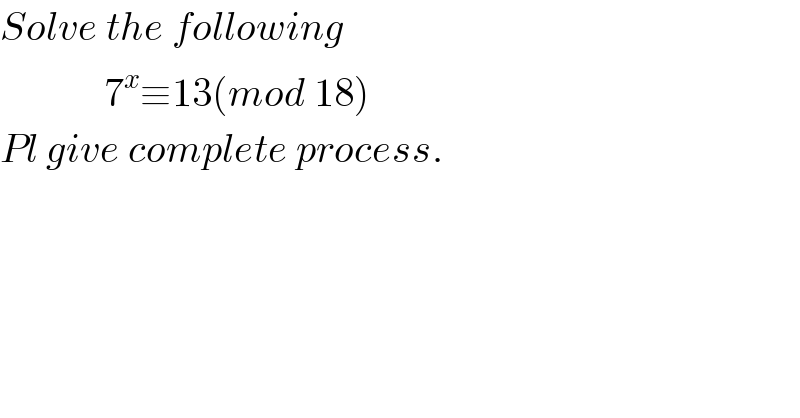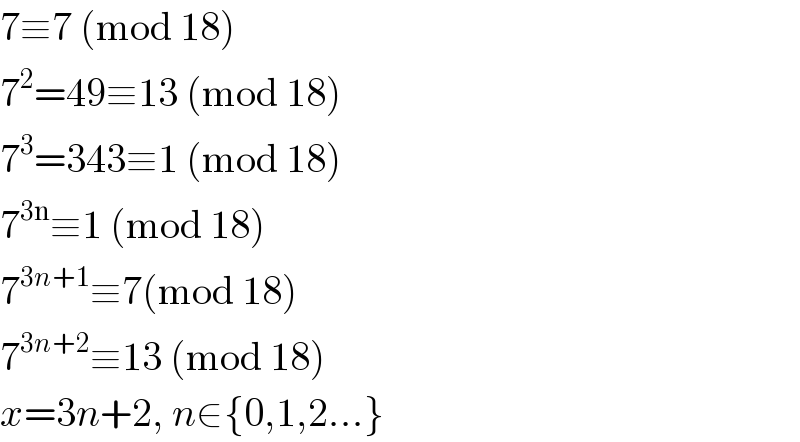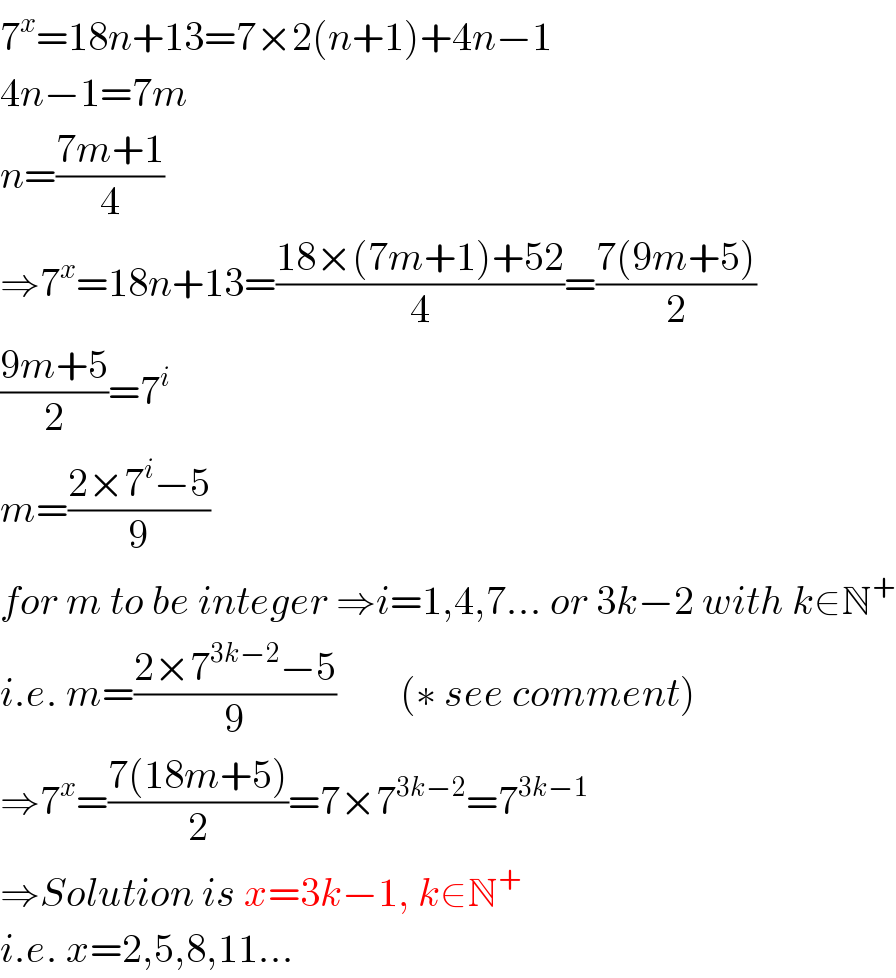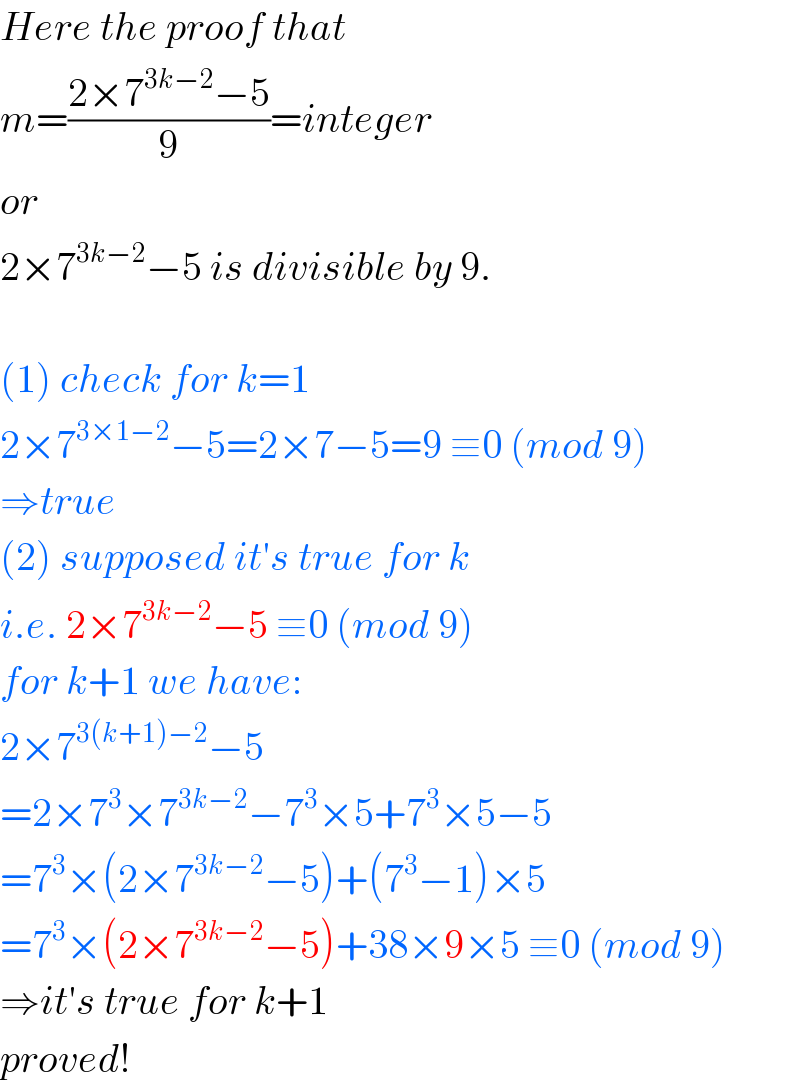
Question Number 13744 by AH Soomro last updated on 23/May/17

$${Solve}\:{the}\:{following} \\ $$$$\:\:\:\:\:\:\:\:\:\:\:\:\:\mathrm{7}^{{x}} \equiv\mathrm{13}\left({mod}\:\mathrm{18}\right) \\ $$$${Pl}\:{give}\:{complete}\:{process}. \\ $$
Commented by prakash jain last updated on 23/May/17

$$\mathrm{7}\equiv\mathrm{7}\:\left(\mathrm{mod}\:\mathrm{18}\right) \\ $$$$\mathrm{7}^{\mathrm{2}} =\mathrm{49}\equiv\mathrm{13}\:\left(\mathrm{mod}\:\mathrm{18}\right) \\ $$$$\mathrm{7}^{\mathrm{3}} =\mathrm{343}\equiv\mathrm{1}\:\left(\mathrm{mod}\:\mathrm{18}\right) \\ $$$$\mathrm{7}^{\mathrm{3n}} \equiv\mathrm{1}\:\left(\mathrm{mod}\:\mathrm{18}\right) \\ $$$$\mathrm{7}^{\mathrm{3}{n}+\mathrm{1}} \equiv\mathrm{7}\left(\mathrm{mod}\:\mathrm{18}\right) \\ $$$$\mathrm{7}^{\mathrm{3}{n}+\mathrm{2}} \equiv\mathrm{13}\:\left(\mathrm{mod}\:\mathrm{18}\right) \\ $$$${x}=\mathrm{3}{n}+\mathrm{2},\:{n}\in\left\{\mathrm{0},\mathrm{1},\mathrm{2}...\right\} \\ $$
Commented by mrW1 last updated on 23/May/17

$$\oint{antastiC}! \\ $$
Commented by RasheedSindhi last updated on 24/May/17
![We can come directly to third step, because Euler′s theorem tells us that If (a,m)=1, then a^(∅(m)) ≡1(mod m) [ where ∅ is Euler function and ∅(m) is meant number of coprimes of m which are not greater than m.] Hence 7^3 ≡1(mod 18) ∵ ∅(7)=3 and (7,18)=1](Q13858.png)
$$\mathrm{We}\:\mathrm{can}\:\mathrm{come}\:\mathrm{directly}\:\mathrm{to} \\ $$$$\mathrm{third}\:\mathrm{step},\:\mathrm{because}\:\mathrm{Euler}'\mathrm{s} \\ $$$$\mathrm{theorem}\:\mathrm{tells}\:\mathrm{us}\:\mathrm{that}\: \\ $$$$\:\:\:\:\:\mathrm{If}\:\:\left(\mathrm{a},\mathrm{m}\right)=\mathrm{1},\:\mathrm{then}\: \\ $$$$\:\:\:\:\:\:\:\:\:\:\:\:\:\:\:\:\:\:\:\:\:\mathrm{a}^{\emptyset\left(\mathrm{m}\right)} \equiv\mathrm{1}\left(\mathrm{mod}\:\mathrm{m}\right) \\ $$$$\:\:\:\:\:\:\:\left[\:\mathrm{where}\:\emptyset\:\mathrm{is}\:\mathrm{Euler}\:\mathrm{function}\right. \\ $$$$\mathrm{and}\:\:\emptyset\left(\mathrm{m}\right)\:\mathrm{is}\:\mathrm{meant}\:\mathrm{number}\:\mathrm{of} \\ $$$$\mathrm{coprimes}\:\mathrm{of}\:\:\mathrm{m}\:\mathrm{which}\:\mathrm{are}\:\mathrm{not} \\ $$$$\left.\:\mathrm{greater}\:\mathrm{than}\:\mathrm{m}.\right] \\ $$$$\mathrm{Hence}\:\mathrm{7}^{\mathrm{3}} \equiv\mathrm{1}\left(\mathrm{mod}\:\mathrm{18}\right) \\ $$$$\because\:\emptyset\left(\mathrm{7}\right)=\mathrm{3}\:\mathrm{and}\:\left(\mathrm{7},\mathrm{18}\right)=\mathrm{1} \\ $$
Commented by AH Soomro last updated on 24/May/17

$$\mathrm{Thanks}\:\mathrm{to}\:\mathrm{all}. \\ $$
Answered by mrW1 last updated on 23/May/17

$$\mathrm{7}^{{x}} =\mathrm{18}{n}+\mathrm{13}=\mathrm{7}×\mathrm{2}\left({n}+\mathrm{1}\right)+\mathrm{4}{n}−\mathrm{1} \\ $$$$\mathrm{4}{n}−\mathrm{1}=\mathrm{7}{m} \\ $$$${n}=\frac{\mathrm{7}{m}+\mathrm{1}}{\mathrm{4}} \\ $$$$\Rightarrow\mathrm{7}^{{x}} =\mathrm{18}{n}+\mathrm{13}=\frac{\mathrm{18}×\left(\mathrm{7}{m}+\mathrm{1}\right)+\mathrm{52}}{\mathrm{4}}=\frac{\mathrm{7}\left(\mathrm{9}{m}+\mathrm{5}\right)}{\mathrm{2}} \\ $$$$\frac{\mathrm{9}{m}+\mathrm{5}}{\mathrm{2}}=\mathrm{7}^{{i}} \\ $$$${m}=\frac{\mathrm{2}×\mathrm{7}^{{i}} −\mathrm{5}}{\mathrm{9}} \\ $$$${for}\:{m}\:{to}\:{be}\:{integer}\:\Rightarrow{i}=\mathrm{1},\mathrm{4},\mathrm{7}...\:{or}\:\mathrm{3}{k}−\mathrm{2}\:{with}\:{k}\in\mathbb{N}^{+} \\ $$$${i}.{e}.\:{m}=\frac{\mathrm{2}×\mathrm{7}^{\mathrm{3}{k}−\mathrm{2}} −\mathrm{5}}{\mathrm{9}}\:\:\:\:\:\:\:\:\left(\ast\:{see}\:{comment}\right) \\ $$$$\Rightarrow\mathrm{7}^{{x}} =\frac{\mathrm{7}\left(\mathrm{18}{m}+\mathrm{5}\right)}{\mathrm{2}}=\mathrm{7}×\mathrm{7}^{\mathrm{3}{k}−\mathrm{2}} =\mathrm{7}^{\mathrm{3}{k}−\mathrm{1}} \\ $$$$\Rightarrow{Solution}\:{is}\:{x}=\mathrm{3}{k}−\mathrm{1},\:{k}\in\mathbb{N}^{+} \\ $$$${i}.{e}.\:{x}=\mathrm{2},\mathrm{5},\mathrm{8},\mathrm{11}... \\ $$
Commented by mrW1 last updated on 23/May/17

$${Here}\:{the}\:{proof}\:{that} \\ $$$${m}=\frac{\mathrm{2}×\mathrm{7}^{\mathrm{3}{k}−\mathrm{2}} −\mathrm{5}}{\mathrm{9}}={integer} \\ $$$${or} \\ $$$$\mathrm{2}×\mathrm{7}^{\mathrm{3}{k}−\mathrm{2}} −\mathrm{5}\:{is}\:{divisible}\:{by}\:\mathrm{9}. \\ $$$$ \\ $$$$\left(\mathrm{1}\right)\:{check}\:{for}\:{k}=\mathrm{1} \\ $$$$\mathrm{2}×\mathrm{7}^{\mathrm{3}×\mathrm{1}−\mathrm{2}} −\mathrm{5}=\mathrm{2}×\mathrm{7}−\mathrm{5}=\mathrm{9}\:\equiv\mathrm{0}\:\left({mod}\:\mathrm{9}\right) \\ $$$$\Rightarrow{true} \\ $$$$\left(\mathrm{2}\right)\:{supposed}\:{it}'{s}\:{true}\:{for}\:{k} \\ $$$${i}.{e}.\:\mathrm{2}×\mathrm{7}^{\mathrm{3}{k}−\mathrm{2}} −\mathrm{5}\:\equiv\mathrm{0}\:\left({mod}\:\mathrm{9}\right) \\ $$$${for}\:{k}+\mathrm{1}\:{we}\:{have}: \\ $$$$\mathrm{2}×\mathrm{7}^{\mathrm{3}\left({k}+\mathrm{1}\right)−\mathrm{2}} −\mathrm{5} \\ $$$$=\mathrm{2}×\mathrm{7}^{\mathrm{3}} ×\mathrm{7}^{\mathrm{3}{k}−\mathrm{2}} −\mathrm{7}^{\mathrm{3}} ×\mathrm{5}+\mathrm{7}^{\mathrm{3}} ×\mathrm{5}−\mathrm{5} \\ $$$$=\mathrm{7}^{\mathrm{3}} ×\left(\mathrm{2}×\mathrm{7}^{\mathrm{3}{k}−\mathrm{2}} −\mathrm{5}\right)+\left(\mathrm{7}^{\mathrm{3}} −\mathrm{1}\right)×\mathrm{5} \\ $$$$=\mathrm{7}^{\mathrm{3}} ×\left(\mathrm{2}×\mathrm{7}^{\mathrm{3}{k}−\mathrm{2}} −\mathrm{5}\right)+\mathrm{38}×\mathrm{9}×\mathrm{5}\:\equiv\mathrm{0}\:\left({mod}\:\mathrm{9}\right) \\ $$$$\Rightarrow{it}'{s}\:{true}\:{for}\:{k}+\mathrm{1} \\ $$$${proved}! \\ $$
Commented by AH Soomro last updated on 24/May/17

$${Thanks}. \\ $$
